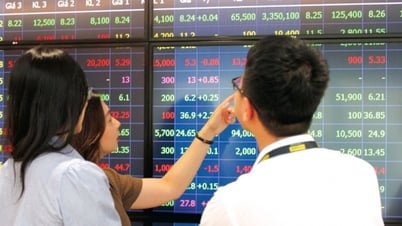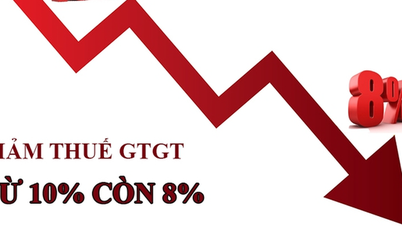Although the exact level of the corresponding tax is not yet known, the Vietnamese stock market has reacted, with a series of stock groups declining, especially groups predicted to be negatively affected such as seafood exports, textiles, industrial real estate, seaports, etc.
In fact, after the decline on April 2-9, the market entered a recovery phase from April 9 to April 22, when the VN-Index increased by 9.4%, from 1,094.3 points to 1,197.13 points. However, many groups of stocks did not recover, tending to continue to fall deeper than the bottom of April 9, such as stocks in the industrial real estate, seafood, textile, rubber groups, etc.
For example, shares of Vinh Hoan Joint Stock Company (code VHC) decreased by 7.3%, to VND43,750/share; shares of Phuoc Hoa Rubber Joint Stock Company (code PHR) decreased by 13.5%, to VND40,850/share; shares of Saigon VRG Investment Joint Stock Company (code SIP) decreased by 13%, to VND56,100/share; shares of Sonadezi Chau Duc Joint Stock Company (code SZC) decreased by 10.7%, to VND28,000/share; shares of Song Hong Garment Joint Stock Company (code MSH) decreased by 10.7%, to VND39,250/share; shares of Vietnam Rubber Industry Group - JSC (code GVR) decreased by 6.9%, to VND22,300/share...
Thus, although the market recovered, there were signs of differentiation, many stocks continued to decrease, putting more pressure on investors to use debt (securities company margin) to persistently hold stocks in the hope that stocks that had fallen deeply would recover. The overreactions in the market were only short-term, but in reality, some groups of stocks continued to be sold.
Faced with unexpected developments that could change the economic outlook, many listed business leaders have a cautious view. Mr. Pham Viet Anh, Chairman of the Board of Directors of PetroVietnam Transportation Corporation (PVTrans, code PVT) commented that the rising wave of protectionism is putting globalization at risk. When globalization weakens, international trade activities are immediately affected, and logistics is the first, fastest and most direct sector to be affected.
“Because the US decided to temporarily postpone the imposition of reciprocal tariffs for 90 days, the impact on transportation activities is not significant at the moment. The company has proactively reviewed the entire customer portfolio, existing contracts, including long-term contracts, because in the context of market fluctuations, early termination clauses may arise. The review and risk assessment are being continuously updated. Currently, the freight rate has decreased slightly but not to an alarming level. According to the assessment, tariffs are a short-term factor. After the “shaky” period, the market will gradually stabilize again,” Mr. Viet Anh emphasized.
Similarly, Duc Thanh Wood Processing Joint Stock Company (code GDT) believes that wood exporting enterprises are also expected to be negatively affected by tariffs, but the company's leaders are still steadfast in their business plan of increasing profits by 8% in 2025, to VND65 billion.
Ms. Le Hai Lieu, Chairman of the Board of Directors of Duc Thanh Wood, affirmed: "Duc Thanh Wood is still confident with the plan to increase revenue and profit in 2025, because the plan set at the beginning of the year does not depend on any customer, does not depend on any market and the US market accounts for a small proportion."
Regarding the textile industry, Mr. Song Jae Ho, General Director of Thanh Cong Textile - Investment - Trading Joint Stock Company (code TCM) said that the US market accounts for 30% of Thanh Cong's export revenue. Compared to other enterprises, the Company has a lower proportion so it is less affected. To reduce dependence on the US market, the Company aims to develop the Japanese, Korean and European markets.
“Vietnam is not the target of the US's trade restrictions, so there should be no need to worry too much,” said Song Jae Ho, hoping for opportunities for the textile industry.
In the pangasius industry, Vinh Hoan is the industry leader, with the largest export market share to the US, accounting for about 43.8% of total export revenue. Ms. Nguyen Ngo Vi Tam, General Director of Vinh Hoan shared that Vinh Hoan continues to cooperate closely with customers, suppliers and local communities, demonstrating the spirit of resilience and determination that has always led us to overcome challenges in the past.
In addition to being cautious, Vinh Hoan also lowered its business plan forecast. In 2025, the Company plans to do business with 2 scenarios. Accordingly, the basic scenario is expected to earn VND1,000 billion in profit, down 18.4% year-on-year and down VND500 billion compared to the initial plan of VND1,500 billion in profit. In the high scenario, the expected profit is VND1,300 billion, down 1.3% year-on-year and down VND200 billion compared to the plan at the beginning of the year.
Thus, for the group directly affected by tariffs, businesses are showing caution, continuing to observe, and some units are looking for ways to shift their consumption markets to avoid dependence on the US market.
Source: https://baodautu.vn/doanh-nghiep-than-trong-voi-thue-quan-trong-mua-dai-hoi-d273275.html


![[Photo] Prime Minister Pham Minh Chinh meets with US business representatives](https://vphoto.vietnam.vn/thumb/1200x675/vietnam/resource/IMAGE/2025/5/13/5bf2bff8977041adab2baf9944e547b5)



![[Photo] President Luong Cuong attends the inauguration of the international container port in Hai Phong](https://vphoto.vietnam.vn/thumb/1200x675/vietnam/resource/IMAGE/2025/5/13/9544c01a03e241fdadb6f9708e1c0b65)
























































































Comment (0)